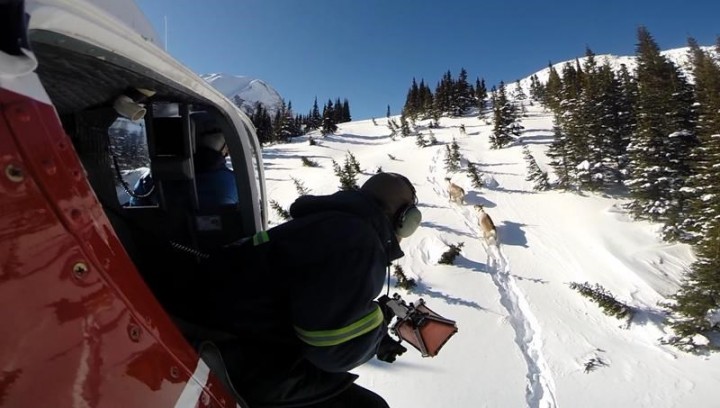A British Columbia caribou herd has tripled its size in less than decade as other such herds in Canada struggle to even survive.
The reason? A combination of predator control, habitat protection and the tender care of First Nations guardians, who live alongside pregnant caribou cows in penned-off, high-altitude valleys for months at a time.
“There’s no other place where we’ve tripled a herd of caribou in such a short time,” said Clayton Lamb, a University of British Columbia scientist who has co-authored a pair of published papers with two First Nations on the comeback of the Klinse-Za herd.
“I’m incredibly encouraged by those results.”
Caribou, once so much a part of the Canadian landscape that they appear on the quarter, are struggling across the country. Their natural habitat — old-growth boreal forests — are also where humans like to log and drill.
Herds from Newfoundland and Labrador to the Northwest Territories are teetering. Biologists have called caribou preservation one of the toughest conservation problems on the continent.
In 2013, the Klinse-Za herd in northeastern B.C. was down to 38 animals and facing extirpation. Two local First Nations, the West Moberly and the Saulteau, weren’t prepared to see that.
They called a meeting with industry and government representatives and proposed something radical. While they would continue efforts to reduce wolf numbers to historical norms, they would also capture pregnant cows, take them somewhere safe to calve, then watch over them until the newborns were established.
“It was a lot of convincing,” said Saulteau member Naomi Owens-Beek.
But in March 2014, the first batch of about a dozen cows was captured and taken to an alpine valley. The valley was protected by electric fencing, with black landscape cloth on the inside to hide the wire.
Two members of the First Nations lived with the caribou, keeping constant watch via snowmobile and ATV and stayed in a primitive cabin with a front porch for a kitchen.
“It takes a lot to be a guardian,” said Owens-Beek. “You’re living at the pen 24-7.
“We can’t leave the gals unwatched. They have to be fed twice a day. They have to be observed to make sure everyone’s doing OK.”
Caribou normally eat lichen and each year, community members gather up 400 garbage bags of the stuff from local forests to see the “gals” through their first weeks.
The calves come along in late May and early June. The pairs spend weeks in the high country, safely fenced off, until they are returned to the herd in July.
As of March, after nine penning seasons, the Klinse-Za herd is 114 strong, a growth rate of 13 per cent per year. Newborn survival rates have improved by 50 per cent and more than doubled for yearlings. Cow-calf pairs reintegrate with the herd just fine.
“It’s an unprecedented conservation success,” said Lamb.
Meanwhile, neighbouring herds without the benefit of the maternity pen have declined by 14 per cent.
Much of Klinse-Za’s recovery is due to a wolf cull program that reduced the predator’s population density from more than 12 animals per 1,000 square kilometres to fewer than three — closer to historical averages.
The other crucial component was a 2020 deal between Ottawa and the province to protect and restore about 8,100 square kilometres of natural caribou habitat in the area. There was a cost, said Lamb.
“There was resource extraction planned. Now, a large portion of that landscape isn’t available.”
But there’s no point in nurturing calves if they don’t have a place to grow up, said Owens-Beek.
“Habitat restoration is key. We need a good place for them to live.”
Ultimately, the plan is to build up the herd and provide it with enough viable habitat to sustain itself.
“We won’t need the pen anymore,” Owens-Beek said.
Meanwhile, she said the bands’ elders, who remember caribou so abundant they were “like bugs on the landscape,” are thrilled. And other First Nations are already contacting the Moberly and Saulteau bands to inquire about the program’s success.
It could be the start of something, said Lamb.
“It’s such an innovative and community-led conservation act,” he said. “I’m hoping it starts to speak to a paradigm shift in how conservation is done in Canada.
“Its success speaks for itself.”
This report by The Canadian Press was first published April 1, 2022.
— Follow Bob Weber on Twitter at @row1960
Bob Weber, The Canadian Press
Related






























